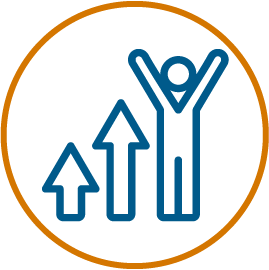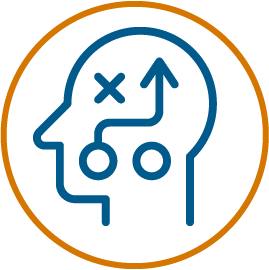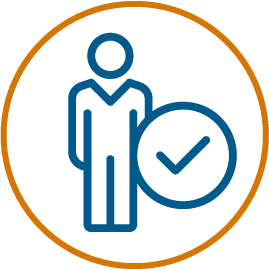Learn to use technology to enhance opportunities for people with visual impairments in vocational, educational, and avocational settings.
Program Type
Graduate Certificate
Semester Start
Fall
Study Options
Online
Minimum Duration
1 Year
UMass Boston’s Assistive Technology for Individuals with Visual Impairments Certificate focuses on training professionals to assist individuals with visual impairments, and enhance their technological skills to enhance opportunities in a variety of settings, including vocational, educational, independent living, and avocational settings. It’s designed for teachers and other professionals who want to work with people with visual impairments and help them lead safe, productive, and independent lives. Explore cutting-edge learning technologies and gain practical hands-on experience through fieldwork. Apply these skills to assist people of all ages in different settings — from state and federal agencies to private agencies to public and private schools. This program prepares you to sit for national professional exams through the Academy for Certification of Vision Rehabilitation & Education Professionals.
Tuition
- This program consists of four 3-credit courses and four 4-credit courses, or 28 credits.
- Those with a background in visual impairments may be eligible to complete the certification program in 19 credits. This includes:
- Teachers of those with visual impairments
- Those holding a bachelor’s degree or higher in Vision Studies
- Those holding a certification through ACVREP, such as COMS, CVRT, or CLVT
- Each course is $1,401.
- Total estimated cost to complete this program ranges from $7,000 - $13,076, depending on number of credits needed to complete the program.
- Other fees may apply. Request Info to connect with a program representative for further details.
This certificate can be completed in one year, but can take up to 2 years if you do not have vision background.
Deadline
- Applications to start in the fall semester are due by June 15.
Application Checklist
- Online Application — Applicants are accepted into the O&M program once a year, for the summer semester only. Application deadline is March 1. Specify that you are applying to the Orientation & Mobility certificate.
- Transcripts — Official transcripts from all undergraduate and graduate institutions attended. A 3.0 undergraduate GPA is required.
- Three Letters of Recommendation — Use the forms provided by the Office of Graduate Admissions. Emphasis should be on academic and professional references.
- Test Scores: GRE, MAT, or MTEL — If you do not have a master’s degree, you will be required to take the Graduate Record Examination (GRE), Miller Analogies Test (MAT), or Massachusetts Test for Educator Licensure (MTEL).
- Statement of Interest and Intent (Required Writing Sample) — Submit a two-part essay:
- Explain your reasons for wishing to pursue graduate studies (approximately 300 words).
- Indicate your specific interest in Orientation & Mobility and discuss the type of work you would like to do in this field (at least 1,200 words).
- This statement will be reviewed for both your overall message and your ability to write at the graduate level. Proofread your writing carefully; it is ranked according to its clarity, grammar, and syntax.
- Personal Interview with Faculty Member — When the Office of Graduate Admissions has notified us of your completed application, we will contact qualified candidates to arrange an interview (either in person or via teleconference).
- International Applicants Only — TOEFL Test Scores
- Braille I (VISN 603)
Become prepared to teach the reading and writing of Grade 2 Braille. You’ll learn how to write literary Braille using both a Perkins Brailler and a slate and stylus. You’ll explore topics including reading-readiness, tracking, tactile discrimination, and reading methods. - Visual Functioning (VISN 604)
Get a practical look at the functional impact of visual impairment through the use of simulated exercises. The course includes a series of medically related lectures by affiliated ophthalmologists covering various topics, including the structure of the eye, the assessment of normal and abnormal vision, optics, and the functional implications of common pathologies. You and your fellow students will discuss low-vision services and participate in ''hands-on'' training within a low-vision clinic. - Implications of Low Vision (VISN 605)
This course goes beyond the physical aspects of vision loss to look at functional and psychological aspects. You’ll review clinical procedures and the interpretation of clinical reports with an emphasis on conducting individualized functional vision assessments. You’ll apply previous study of optics to optical low-vision devices. In this course, you’ll get a practical, hands-on approach to learning through vision-simulation activities and the development of a functional vision-assessment kit. - Introduction to Assistive Technology for People with Visual Impairments (VISN 660)
Get an introduction to the profession of Assistive Technology Instructional Specialist for People with Visual Impairments. Learn through demonstrations, hands-on activities, and independent learning exercises about a variety of assistive technology solutions for people of all ages who are blind or visually impaired, including screen magnification software, screen reading software, OCR software, braille technologies, low vision devices, smartphone and tablet accessibility features, as well as other specialized devices designed for people with visual impairments. You’ll discuss the benefits and limitations of accessibility features that are built-in to mainstream technologies compared to specialized assistive technology devices and software, as well as techniques for determining the most appropriate assistive technology solutions. You’ll also explore strategies for integrating assistive technology in different settings, such as in schools, homes, colleges/universities, job sites, and avocational settings. - Assistive Technology Assessment and Instruction for People with Visual Impairments (VISN 661)
Gain a thorough overview of assessment and instruction techniques for teaching assistive technology to people with visual impairments of all ages. You’ll cover various topics, including task analysis; lesson and training plan development; learning development and evolution of assistive technology skills during instruction; learning theories as applied to children and adults; instructional strategies for assistive technology; conduction assistive technology assessments; making decisions regarding appropriate devices; choosing appropriate learning modalities; justifying recommendations; applying different AT assessment techniques, such as HAAT, WATI, and SETT; ethical issues related to AT assessment and services; and writing AT assessment reports. You’ll explore ethical issues at AT, evaluating the effectiveness at AT services, using AT with productivity platforms on different operating systems, developing curriculum for teaching screen magnification and screen reading software on different operating systems, developing curriculum for teaching accessible apps on mobile devices, as well as developing curriculum for teaching accessible stand-alone devices, accessible third-party applications, and built-in accessibility features. - Configuration and Exploration of Assistive Technology Solutions for Visual Impairment (VISN 662)
In this course, you’ll learn and apply configuration and exploration strategies for mainstream and assistive technologies. You’ll explore a variety of topics, including operating systems and computing devices, various PC components, operational procedures for professionalism and effective communication, technical support resources for accessibility for major operating systems, tools used for computer maintenance and repair, installing software and operating system updates, setting up and using built-in accessibility features in different operating systems, operating system maintenance procedures, setup and configuration of systems and devices for remote training, determining if remote training and support is appropriate, conferences and educational opportunities to keep up to date with various technologies, computer maintenance tools and procedures, disabling and removing of unnecessary or inaccessible third-party software, troubleshooting computing technology, virtualized operating systems, display technologies, options for self-teaching and continuing education to remain current with various technologies, local networking, wireless networking, wireless communications technologies, connecting to the internet, configuring email, troubleshooting internet issues, portable and mobile computing technology, and security measures for computing technology. - Technological Methods of Accessibility and Accommodations for People with Visual Impairments (VISN 663)
Get an overview of best practices for providing assistive technology services to people with visual impairments, as well as digital accessibility and usability, accommodations, and universal design in educational, vocational, avocational, and home environments. You’ll learn through demonstrations, hands-on activities, and independent learning exercises about strategies for creating accessible instructional materials in a variety of formats and learning modalities, customizing screen readers on various operation systems for compatibility with third-party applications, and personalizing assistive technology options. You’ll explore a variety of assistive technologies, techniques, and strategies for working with people who have visual impairments, as well as additional disabilities. - Assistive Technology for People with Visual Impairments Practicum (VISN 669)
Participate in a supervised practicum within the Assistive Technology Program working with students who are visually impaired, ranging from school aged students to adult vocational and geriatric populations. Pre-registration for the Assistive Technology for People with Visual Impairments Practicum is required one semester prior to enrollment, along with documentation of completion of all required courses and successful completion of a minimum of 25 integrated field hours for assistive technology experiences. The practicum site must be approved by the Program Coordinator. In addition to the field-based experience, you’re expected to obtain a passing score on the national professional certified Assistive Technology Instructional Specialist for People with Visual Impairments examination through the Academy for Certification for Vision Rehabilitation and Education Professional (ACVREP).
At the end of this one-year program, you’ll be awarded a Certificate in Assistive Technology for Individuals with Visual Impairments. The certificate will demonstrate your expertise in the field on your résumé, as well as in interviews and workplace evaluations. Upon completion of the program, you will be prepared to sit for the national professional exam through the Academy for Certification of Vision Rehabilitation & Education Professionals.
Why UMass Boston Online?
Value
Among the lowest online tuition rates of an accredited, public research university.
Flexibility
Study full-time to finish fast, or part-time to suit your schedule. Live sessions scheduled with the working professional in mind.
Authenticity
The same courses taught by the same academic departments as on campus. No third-party providers.
Learn More






